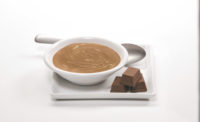
Furthermore, egg products contribute to a premium positioning. They provide a natural richness, flavor and color that compares to no other stabilizer in the marketplace.
Out of the shell
Whole eggs are composed of two distinct parts-the albumen, or white, and the yolk, or yellow-with each part providing different and important nutrients and functionalities. Whites are mostly water and protein; whereas the yolks contain the entire fat content of the egg, along with a little less than half of the protein and a high proportion of vitamins and minerals. It is the yolks that many food formulators turn to for help with stabilizing otherwise unstable systems.
Food manufacturers seldom work with shelled eggs, rather, they use pasteurized egg products, which come in three basic forms: Dried, frozen and liquid. At the commercial level, dried egg products are typically economical and the easiest to use. Because they are almost free of moisture, manufacturers are only paying shipping costs for the desired solids. Furthermore, by removing moisture, dried egg products have an extended ambient temperature shelflife. They are the most concentrated form of egg product ingredients and can be stored and used on an as-needed basis.
Applications in dairy foods
Title 21 Section 135.110 of the Code of Federal Regulations (CFR) states that ice cream called frozen custard, French ice cream or French custard ice cream must contain a minimum of 1.4% egg yolk solids by weight of the food, exclusive of the weight of any bulky flavoring ingredients. When bulky flavors are added to the frozen custard mix, the egg yolk solids content may be reduced in proportion to the amount by weight of the bulky flavors added, but the finished product cannot contain less than 1.12% egg yolk solids.Other frozen dairy products can also benefit from the addition of egg products, as the yolks truly are superior emulsifiers. The phospholipids and lipoproteins in the yolk serve as surface-active agents, stabilizing milkfat with water. By doing so, the yolk helps eliminate crystallization and decreases melting point. Thus, addition of whole egg or egg yolk products to ice cream mix produces a frozen product with a smooth and creamy texture and rich flavor and color.
Egg whites, which are primarily protein, are currently being used by some frozen dairy dessert manufacturers to make product described as "low-carb." Composed of high-quality protein, egg white helps reduce net carbohydrate levels without contributing any off flavors or colors. In fact, egg white in frozen desserts is virtually tasteless.
Egg whites are also popular in refrigerated dairy products, such as ready-to-eat desserts and the new generation of cultured "whipped" products. Egg white proteins, though not emulsifiers, create very stable foams. Egg proteins can be whipped into foams and blended with dairy bases such as yogurt or pudding to create aerated, indulgent desserts that are light tasting, and often low in calories, as air is calorie free.
Ready-made dairy desserts sold through supermarkets are very popular overseas. In recent years, more and more of these products, such as ready-to-eat puddings, layered gelatins with whipped toppings, mousses and custards, have been appearing in refrigerated cases across the country. A crucial ingredient in all the refrigerated desserts just mentioned is eggs. Egg products coagulate and thicken custards, flans and puddings. The proteins in egg white are the key component here, as they turn the fluid dessert into one that is gelled. It is also the egg white proteins, as previously mentioned, that aerate creams and other dairy bases.
The final dairy category where eggs "blend" in perfectly is select blended beverages. The most obvious, and actually an application required by 21 CFR 131.170, is eggnog. According to the standard of identity, the egg yolk solids content in eggnog cannot be not less than 1% by weight of the finished food. Eggs thicken, flavor and color this seasonal beverage. Pasteurized egg yolk products are available, eliminating all microbial concerns. This helps dairy processors achieve the longer shelflife that so many are targeting these days of increased distribution territories and alternative sales venues.
Besides eggnog, egg products can be used in pourable cultured dairy drinks such as yogurt smoothies. Similar to how the egg yolk functions in eggnog, in smoothies it can provide creaminess and richness. If targeting a high-protein content, egg products are a great ingredient to turn to when formulating energy or meal replacement beverages.
They don't call it "The incredible edible egg®" for nothing!

